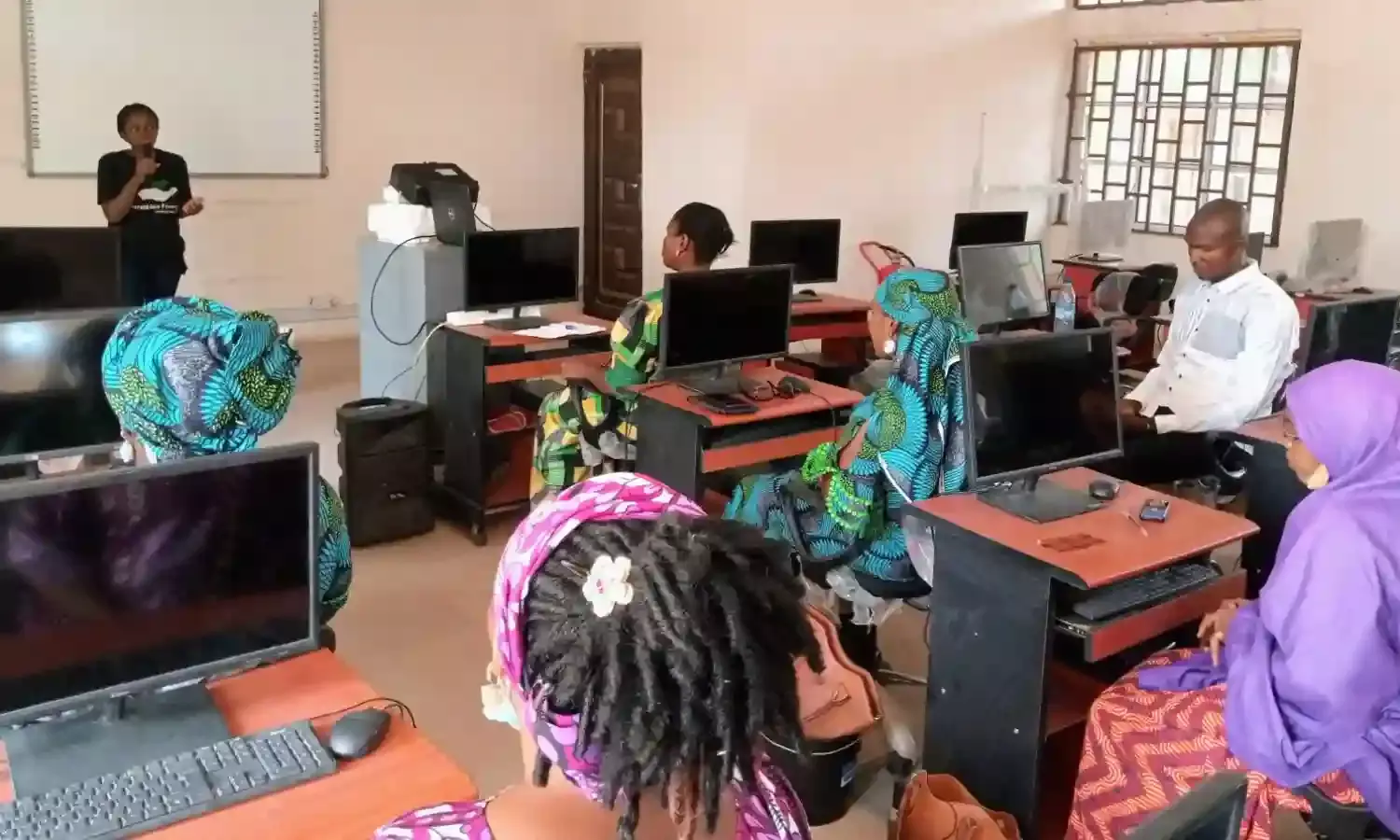Foundation transforms Kaduna teachers to digital
Ode said “the world is evolving, and teaching and learning processes have gone digital, therefore, our teachers must not be left behind; they must be equipped with the needed digital skills to be able to improve teaching delivery in the classroom.”;

Chief Executive Officer, Emerald-Isle Foundation, Ms Evelyn Ode addressing participants at the five-day training of primary school teachers on digital skills in Kaduna
A Kaduna-based Non-Government Organisation, Emerald-Isle Foundation (EIF), has opened a five-day training for primary school teachers in Kaduna State on digital literacy.
The group’s Chief Executive Officer, Ms Evelyn Ode, said at the opening of the training at Queen Amina College Kakuri, Kaduna, that the aim was to transform the teachers from analogue to digital teachers.
Ode said that the training was organised in partnership with the Kaduna Basic Education Accountability Mechanism (KADBEAM), IHIFIX Foundation, Queen Amina College, LEAP Africa, and the Coalition of Associations for Leadership, Peace, Empowerment and Development (CALPED).
She added that 25 teachers from Local Education Authority Primary School, Nasarawa I would be trained as pilot on basic digital skills under EIF’s Train the Tutor Project, designed to improve the capacity of teachers.
This, according to her, is in line with the foundation’s focus to help in underserved children to gain access to quality education that will help them actualise their potential.
She said that the training was the second phase, designed to build the capacity of teachers to leverage on digital devices to teach in class with a view to improving learning outcomes.
According to her, the goal is to improve teaching and learning outcomes in public and private schools in Kaduna, in line with the current digital age.
Ode said “the world is evolving, and teaching and learning processes have gone digital, therefore, our teachers must not be left behind; they must be equipped with the needed digital skills to be able to improve teaching delivery in the classroom.”
She explained that the foundation had earlier improved the teachers’ teaching practice with focus on classroom management and taking advantage of child development stages to impact the needed knowledge.
She said digital skills training became necessary to bridge identified gaps during the foundation’s Literacy Drive Project to improve learners’ reading skills using phonics (sounds of letters).
“We noticed the teachers’ inadequate skills on the usage of the internet to source for relevant materials to enrich their lesson plans.
“We then decided to train teachers on the basics of computer, how computers operate, and how they can use online platforms to source for materials to enrich their lesson plans and notes.
“This, in the long run, will trickle down to the learners and improve outcomes.”
The Head Teacher of the school, Mrs Victoria Ayuba, thanked EIF for the gesture, which she described as crucial to effective teaching and learning.
Ayuba particularly said that training would enable the teachers to use online applications to teach jolly phonics in class to make it interesting.
Also, Mr Clement Dogo, the Chairman of Head Teachers, Chikun Local Government Area, said the training would go a long way in transforming teachers, in line with the needs of the 21st century.
He said “it is my desire that all teachers will be trained on digital skills to enable them to use technological devices to prepare lesson plans, lesson notes and make teaching effective and fun.”
Mrs Sarah Ninyo, the acting Education Secretary, Chikun LGA, thanked the foundation for the support to improve learning outcomes in public schools.
Ninyo, who was represented by the Senior Social Mobilising Officer, Mr Andrew Dogo, expressed optimism that digital literacy would significantly impact teachers’ delivery and in the long run, impact on the learning abilities of pupils.
Supreme reports that the foundation and its partners had on Friday organised a stakeholders’ dialogue on digital literacy for teachers.
The education stakeholders at the meeting stressed the need for adequate digital literacy for teachers to improve learning outcomes in public and private schools in the state.

